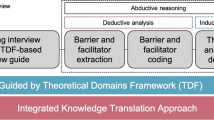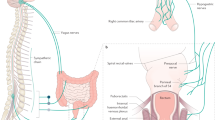Abstract
Study design
Retrospective, cross-sectional study.
Objectives
To investigate prevalence, types, and severity of fecal incontinence (FI) and constipation in adults with spina bifida (SB), in relation to self-perception and help-seeking, and to compare findings to data from a general population reference group.
Setting
University Medical Center Groningen (UMCG), the Netherlands.
Methods
The 294 adults with SB registered at UMCG in 2017 were invited to participate. The Groningen Defecation and Fecal Continence Questionnaire was used to assess functional outcomes for FI and constipation using Rome IV criteria. Vaizey (for FI) and Agachan (for constipation) scores were determined. Socio-demographic factors and self-perception of bowel-related problems were recorded through the questionnaire. Data were compared with an age and sex matched reference group.
Results
The completed questionnaires of 112 (38%) responding participants were analyzed. FI and constipation were more prevalent in the study group (35% and 45%, respectively) than in the reference group (8.9% and 22%, respectively). In general, in participants with SB aperta (SBA; n = 75), FI was more severe than in participants with SB occulta (SBO; n = 37). However, severity of FI was higher in SBO participants than in the SBA group after the age of 61. Bowel problems in adults with SB were associated with worse self-perception regarding health.
Conclusions
In adults with SB, anorectal dysfunction is often present and severe. Older persons with SBO experience more severe FI than in early age. Bowel problems should systematically and more adequately be addressed and controlled throughout adulthood in both the spina bifida groups.
Similar content being viewed by others
Log in or create a free account to read this content
Gain free access to this article, as well as selected content from this journal and more on nature.com
or
Data availability
Additional data is available from the corresponding author on reasonable request.
References
Verhoef M, Lurvink M, Barf HA, Post MWM, Van Asbeck FWA, Gooskens RHJM, et al. High prevalence of incontinence among young adults with spina bifida: Description, prediction and problem perception. Spinal Cord. 2005;43:331–40.
Copp AJ, Adzick NS, Chitty LS, Fletcher JM, Holmbeck GN, Shaw GM, et al. Spina bifida. Nat Rev Dis Prim. 2015;1:15007.
Brochard C, Peyronnet B, Dariel A, Ménard H, Manunta A, Ropert A, et al. Bowel dysfunction related to spina bifida: keep it simple. Dis Colon Rectum. 2017;60:1209–14.
van Meegdenburg MM, Heineman E, Broens PMA. Pudendal neuropathy alone results in urge incontinence rather than in complete fecal incontinence. Dis Colon Rectum. 2015;58:1186–93.
Meinds RJ, van Meegdenburg MM, Trzpis M, Broens PM. On the prevalence of constipation and fecal incontinence, and their co-occurrence, in the Netherlands. Int J Colorectal Dis. 2017;32:475–83.
Meinds RJ, Timmerman MEW, van Meegdenburg MM, Trzpis M, Broens PMA. Reproducibility, feasibility and validity of the Groningen Defecation and Fecal Continence Questionnaires. Scand J Gastroenterol. 2018;53:790–6.
Mearin F, Lacy BE, Chang L, Chey WD, Lembo AJ, Simren M, et al. Bowel disorders. Gastroenterology.2016;S0016-5085:00222–5.
Vaizey CJ, Carapeti E, Cahill JA, Kamm MA. Prospective comparison of faecal incontinence grading systems. Gut.1999;44:77–80.
Rao SS, Bharucha AE, Chiarioni G, Felt-Bersma R, Knowles C, Malcolm A, et al. Functional anorectal disorders. Gastroenterology.2016;S0016-5085:00175–X 10.1053.
Agachan F, Chen T, Pfeifer J, Reissman P, Wexner SD. A constipation scoring system to simplify evaluation and management of constipated patients. Dis Colon Rectum. 1996;39:681–5.
Krogh K, Christensen P, Sabroe S, Laurberg S. Neurogenic bowel dysfunction score. Spinal Cord. 2006;44:625–31.
Abrams P, Cardozo L, Fall M, Griffiths D, Rosier P, Ulmsten U, et al. The standardisation of terminology in lower urinary tract function: report from the standardisation sub-committee of the International Continence Society. Urology.2003;61:37–49.
Alimi Y, Iwanaga J, Oskouian RJ, Loukas M, Tubbs RS. Intelligence quotient in patients with myelomeningocele: a review. Cureus.2018;10:e3137.
Acknowledgements
The authors acknowledge E. Visser, PhD of RoQua (Routine Outcome and Quality Assessment) for helping to process the data of the questionnaires. We also thank all participants who took part in this study.
Author information
Authors and Affiliations
Contributions
NW collected participants’ data, analysed the data, interpreted the results and wrote the manuscript. FH collected the participants’ data. GJFJ Bos and OFB provided feedback during this process. MT helped interpreting results and provided feedback on the manuscript. PMAB was the principal investigator of the study and helped interpreting results and provided feedback on the manuscript. All authors participated in designing and providing feedback on the report.
Corresponding author
Ethics declarations
Competing interests
The authors declare no competing interests.
Ethics approval and consent to participate
The study was approved by the research committee of University Medical Center Groningen, the Netherlands (MCG (METc 2016.162). We certify that all applicable institutional and governmental regulations concerning the ethical use of human volunteers were followed during the course of this research.
Additional information
Publisher’s note Springer Nature remains neutral with regard to jurisdictional claims in published maps and institutional affiliations.
Rights and permissions
About this article
Cite this article
de Wild, N., Herrmann, F., Bos, G.J.F.J. et al. Anorectal dysfunction in adults with spina bifida and associated socio-emotional factors—a retrospective, cross-sectional cohort study. Spinal Cord 60, 679–686 (2022). https://doi.org/10.1038/s41393-022-00754-5
Received:
Revised:
Accepted:
Published:
Version of record:
Issue date:
DOI: https://doi.org/10.1038/s41393-022-00754-5



